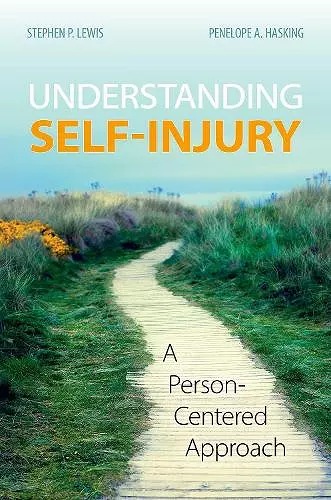Understanding Self-Injury
A Person-Centered Approach
Stephen P Lewis author Penelope A Hasking author
Format:Paperback
Publisher:Oxford University Press Inc
Published:1st Jun '23
Should be back in stock very soon

Nonsuicidal self-injury (NSSI), the purposeful damaging of one's own body tissue without suicidal intent, is a common and serious mental health concern. Engagement in self-injury is associated with numerous mental health difficulties such as major depression. Of particular concern is recent evidence indicating that self-injury is a significant risk factor for suicide. Taken together, understanding self-injury and appropriately responding to people who self-injure is critical. Developing a compassionate understanding of self-injury requires not only knowledge of current research but also essential insights from individuals with lived experience. Understanding Self-injury: A Person-Centered Approach offers a significant departure from traditional texts in the field by adopting a person-centered, strengths-based approach to understanding and addressing self-injury. In addition to giving a general introduction to self-injury, this book offers practical tips for families and caregivers, schools, clinicians, and advocates who support individuals who self-injure. Importantly, priority is given to topics that individuals with lived experience of self-injury find central to their experiences, such as stigma, social media, resilience, recovery, and advocacy. This book is a must-read for anyone who interacts with or plays a supportive role in the lives of people who self-injure, including mental health professionals and students, school professionals, families, researchers, and, importantly, individuals with lived experience of self-injury.
This text offers a refreshing perspective on timely topics for understanding and responding to self injury from a positive framework that seamlessly integrates wisdom from the scientific literature and lived experience. Drs. Lewis and Hasking are pushing the field forward with the contents of this book that are likely to inspire all who wish to make a difference in the lives of those affected by self injury. I'm excited to see this contribution to the field of nonsuicidal self injury as it represents a voice that has been missing until now. * Jennifer J. Muehlenkamp, University of Wisconsin-Eau Claire *
Lewis and Hasking have written a book that is accessible, engaging, and chock full of useful advice. Merging clear, comprehensive application of science with deep understanding of lived experience perspectives, the book lays out clear road maps for compassionately understanding and responding to self injury in families, schools, and the larger community. It adds to this novel examination of how lived self injury experience influences current thinking about language, recovery, and treatment important contributions to researchers and providers. A must read for anyone who works with individuals with lived self injury experience. * Janis L. Whitlock, Director of the Cornell Research Program on Self Injury and Recovery *
The content of this book is applicable in the context of diverse groups-not only for clinicians and researchers but also for teachers, parents, etc.-and leaves the reader with actionable steps they can take to address self-injury and reduce stigma when faced with the need to discuss such a sensitive topic. * Choice *
ISBN: 9780197545065
Dimensions: 235mm x 155mm x 13mm
Weight: 327g
224 pages